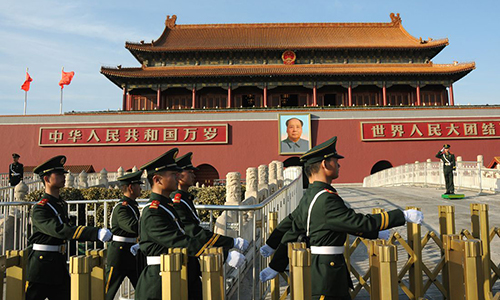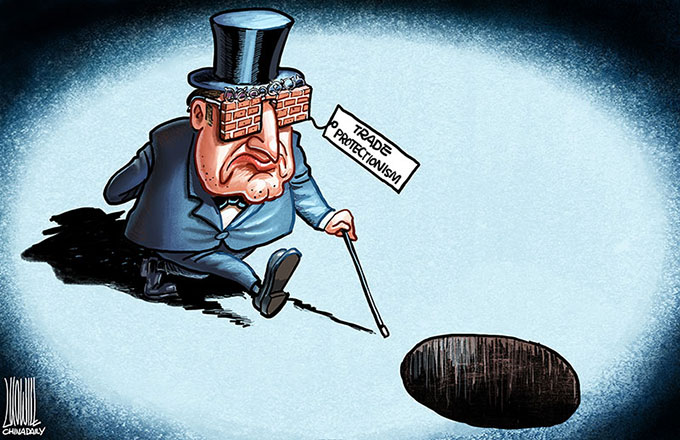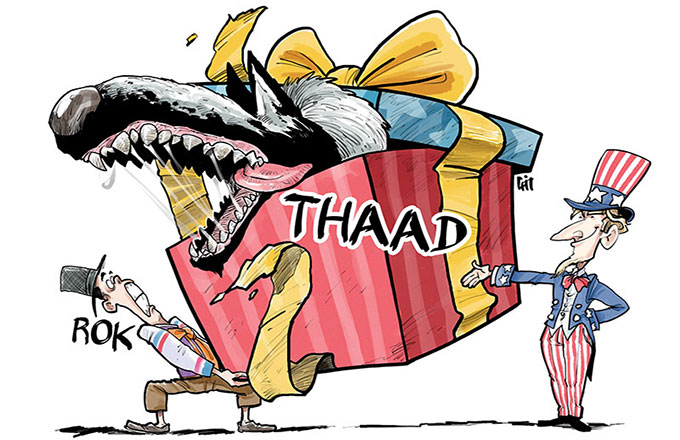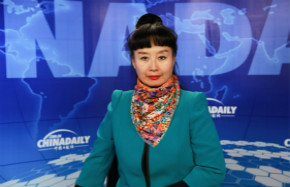The two sessions reflect a bigger picture
 |
|
Policemen march across Tiananmen Square in Beijing, capital of China on February 28, 2017. China's armed police, SWAT teams and other police units have strengthened patrol at Tiananmen Square and nearby areas to ensure the smooth running of the fifth session of the 12th National People's Congress (NPC) and the fifth session of the 12th National Committee of the Chinese People's Political Consultative Conference (CPPCC), or the two sessions.[Photo/CFP] |
During the ongoing annual sessions of the National People's Congress and the Chinese People's Political Consultative Conference National Committee, China watchers scrutinize them all - the official speeches, press conferences, policy announcements, sideline comments, personnel positioning or actions. How is the economy tracking? New policies? Any surprises? What's "in the air"?
Personally, I'm watching five areas: commitment to economic reform, political governance, intensity of social concerns, moves with respect to senior personnel, and relative importance of international affairs.
On economic reform, the headliner is an overarching policy called "supply-side structural reform" that tackles deep-rooted problems, especially industrial overcapacity and excessive corporate debt. What are those mysterious "interest groups" that oppose these essential reforms? Perhaps the biggest challenge is how to implement supply-side structural reform while maintaining an adequate GDP growth rate.
Given China's political system, one concern is that local government officials used to be conditioned to regard economic growth as the major criterion of success and hence the bellwether of their careers. Changes are being made so that senior officials should be evaluated - promoted or demoted - based on diverse criteria, primarily people's satisfaction and sustainable development, not GDP.
On political governance, China's emerging supervisory system increasingly oversees State organs and civil servants. For example, just recently, new supervisory commissions in three localities chosen as pilots in trial operations - Beijing, and Shanxi and Zhejiang provinces - had their leaderships elected by local legislatures, a milestone in the long journey to curb corruption and curtail illicit behavior.
On social concerns, the focus is on which issues generate the most heat, the most passionate pleas from grassroots delegates. Previously, environmental pollution has been hot, triggered no doubt by air pollution in Beijing. This year, which social issue, if any, will stand out? How will delegates react to the draft general provisions of civil law, the first step in establishing a civil code? How will they react to a tough, new law to tax polluters, particularly heavy industry?
On senior personnel, first are the appointments. The new heads of the National Development and Reform Commission, the top economic planning body, and the Ministry of Commerce, both come from within their organizations. Yet the new head of the China Banking Regulatory Commission was previously governor of East China's Shandong province. Second are the so-called "key minorities", the small group of officials at provincial and ministerial level who have significant power and responsibilities.
This was exemplified recently when the Central Commission for Discipline Inspection, China's top disciplinary body, announced that it had uncovered serious problems during inspections of four provincial-level regions. It named the regions as well as the problems: weakening of Party leadership, promotion of corrupt officials, violations of frugality rules, and alarming space for corruption at State-owned enterprises and other sectors.
Will these disciplinary actions be discussed openly at the two sessions? Will further actions be taken?
On international affairs, will China's increasing engagement globally yield a greater emphasis? President Xi Jinping's Belt and Road Initiative is especially relevant, with a grand meeting of leaders from the countries along the Belt and Road routes to be held in May. Moreover, with Donald Trump leading the United States, will China-US relations, particularly regarding trade and sovereignty, command more attention this year?
Finally, we cannot watch this year's two sessions without seeing on the political horizon the force of the 19th National Congress of the Communist Party of China, to be held in the second half of this year. Convened every five years, the CPC National Congress sets leadership and policies for the ensuing five years (and beyond), and in the run-up period, officials position their work and themselves as they deem personally optimal. To watch this year's two sessions perceptively is to view it through the lens of the forthcoming 19th CPC National Congress. We have a crucial year.
The author is a public intellectual, political/economics commentator, and international corporate strategist.
(China Daily 03/04/2017 page8)

























